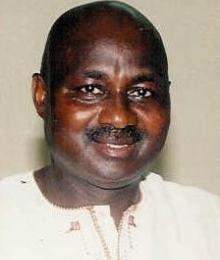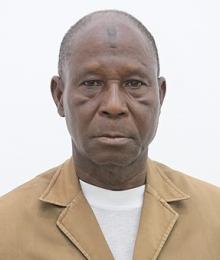
Ibrahima Fofana (January 12, 1952 – April 16, 2010) was a prominent Guinean trade unionist who led the Union Syndicale des Travailleurs de Guinée (USTG) since 1995. A leading figure in Guinea's social movement, he became widely known during the historic general strikes of 2006-2007 against the regime of Lansana Conté, where he played a crucial role despite the violent repression.
A former banking executive turned doctor and tireless advocate for workers' rights, Fofana was also a key player in the democratic transition after 2008 as part of the Forum des Forces Vives. Considered a potential candidate in the 2010 presidential election, his life was tragically cut short in a car accident while traveling to labor negotiations in Fria. He left behind the legacy of a man who, in the words of Prime Minister Jean-Marie Doré, "gave sleepless nights to the enemies of democracy, the enemies of freedom, equality, and justice."
Introduction
Ibrahima Fofana, born on January 12, 1952, in Conakry, and passed away on April 16, 2010, was one of the most significant figures in Guinean trade unionism. A man of conviction and courage, he dedicated his life to defending workers' rights and advocating for democracy in Guinea. Often hailed as a "national hero," his journey reflects an unwavering commitment to social justice and fundamental freedoms. Throughout some of the most tumultuous periods of contemporary Guinean history, Ibrahima Fofana embodied peaceful resistance against authoritarian regimes, becoming a symbol of the Guinean people's aspirations for a better future.
Education
Ibrahima Fofana pursued higher education, ultimately earning a doctorate, which earned him the respectful title of "Dr. Ibrahima Fofana" in official communications and media. Although specific details of his academic background are scarce, his intellectual training equipped him with a critical perspective and analytical skills that fueled his trade union activism. These abilities were invaluable in understanding the complex social and economic issues Guinea faced and in formulating constructive demands on behalf of workers.
Professional Career
Before becoming a prominent trade union leader, Ibrahima Fofana began his career in the banking sector. He became the Secretary General of the Federation of Bank Unions (FESABANK), where he developed expertise in economic and financial matters. This experience gave him a profound understanding of economic mechanisms and the labor issues specific to the financial sector.
Alongside his sector-specific union responsibilities, Fofana gradually established himself as a pivotal voice in Guinean social affairs. His ability to articulate workers' concerns and propose viable solutions distinguished him as a respected interlocutor in discussions with authorities and employers.
Trade Union Leader
In 1995, Ibrahima Fofana was elected head of the Union Syndicale des Travailleurs de Guinée (USTG), one of the country's leading trade union federations. Under his leadership, the USTG became a critical force of both advocacy and opposition in the Guinean socio-political landscape.
As a union leader, Fofana combined firm principles with pragmatic strategies. He built strategic alliances, notably with Rabiatou Serah Diallo, head of the Confédération Nationale des Travailleurs de Guinée (CNTG). Together, they formed the CNTG-USTG inter-union coalition, amplifying their influence on the national stage.
Fofana's vision for trade unionism extended beyond wage demands. He saw it as a driver of social transformation and an essential counterbalance in a society striving for democracy. This outlook led him to oppose authoritarian excesses and actively participate in civic movements advocating for the rule of law in Guinea.
The General Strikes of 2007
Between 2006 and 2007, Ibrahima Fofana's leadership gained national and international recognition during mass protests against the regime of Lansana Conté.
At the end of 2006, following the violent repression of a student protest that left 22 dead, Fofana was among the first to denounce the brutality and demand justice. This stance foreshadowed his involvement in the broader protest movement that followed.
In January and February 2007, the CNTG-USTG coalition organized general strikes of unprecedented scale, which brought the country to a standstill for several weeks. These mobilizations demanded social, economic, and political reforms. As a key architect of the movement, Fofana displayed remarkable courage in the face of intimidation and repression.
At the peak of the crisis, amid severe crackdowns resulting in 186 deaths according to NGOs, Fofana was injured but continued to lead the movement with determination. He played a crucial role in negotiations with the government, appearing on national television in late January to announce a temporary suspension of the strike while maintaining pressure on the regime.
These historic strikes forced significant concessions from the government, including the appointment of a Prime Minister with extended powers and the drafting of a roadmap to resolve the crisis. This success cemented Ibrahima Fofana’s status as one of the most respected figures in Guinean civil society.
Political Engagement and Democratic Transition
After President Lansana Conté's death in December 2008, a military junta led by Captain Moussa Dadis Camara took power. Ibrahima Fofana actively joined the Forum of Active Forces, a coalition of political parties, unions, and civil society organizations opposing the military regime and advocating for a return to constitutional order.
Alongside figures like Jean-Marie Doré and Rabiatou Serah Diallo, Fofana helped thwart the junta's attempts to cling to power. His efforts contributed to the opening of a transition period toward democracy.
In 2010, as Guinea prepared for its first truly democratic presidential election, Ibrahima Fofana was considered a potential independent candidate. His popularity and credibility, forged through his union and civic activism, positioned him as a strong representative of the people's aspirations for change.
Death
Tragically, Ibrahima Fofana did not live to see this historic election. On April 16, 2010, while traveling to Fria (about 150 km north of Conakry) for negotiations between workers on strike and the management of a factory owned by the Russian company Rusal, he died in a car accident.
The accident occurred near the town of Tormelin, 25 km west of Fria, claiming the lives of three others: Magbé Bangoura, Secretary General of the Confederation of Free Trade Unions of Guinea (CSLG), and two journalists from Guinean Radio and Television (RTG), Aboubacar Lansana Camara and Lamba Mansaré. According to police sources, speeding led to the vehicle losing control on a sharp curve before crashing into a tree.
His sudden death, while still actively advocating for workers' rights, sent shockwaves through the country. The government declared a public holiday on April 19, 2010, to allow the nation to pay its respects during his state funeral.
Legacy
Ibrahima Fofana's death inspired a wave of tributes acknowledging his profound impact on Guinean society. Leaders and ordinary citizens alike praised his dedication to social justice and democracy. Rabiatou Serah Diallo described him as her "brother in struggle" and a "tireless defender of workers." Prime Minister Jean-Marie Doré lauded him for having "kept the enemies of democracy, freedom, equality, and justice awake at night."
Banners displayed during his funeral bore the message: “Your fight is ours; you are not dead; you will never die,” reflecting a collective commitment to continuing his struggle.
Conclusion
Ibrahima Fofana remains a symbol of peaceful resistance, social justice, and the power of collective mobilization in Guinea. Although his untimely death deprived the nation of a visionary leader during a pivotal moment, his legacy endures, inspiring future generations of human rights and democracy activists. As Rabiatou Serah Diallo promised at his funeral, those who stood by him have not "lowered their arms."











